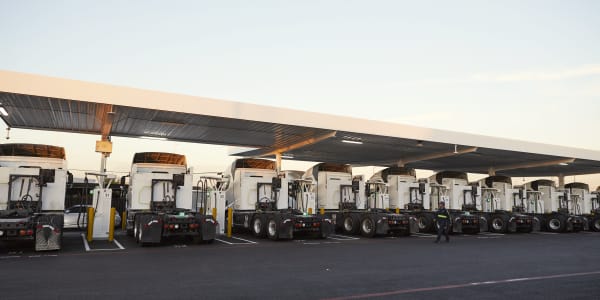Indigo Agriculture, the Boston-based start-up that uses natural microbiology to revolutionize the way farmers grow crops, has unveiled a first-of-a-kind program to tackle climate change worldwide. The company launched the Terraton Initiative on Wednesday to accelerate carbon sequestration from agricultural soil on a massive scale. The goal: to capture 1 trillion metric tons (a teraton) of carbon dioxide worldwide from 3.6 billion acres of farmland through a marketplace that gives farmers incentives to implement regenerative farming practices.
Capturing atmospheric carbon dioxide from agricultural soil is a way to restore soil health while returning carbon levels to those prior to the Industrial Revolution, according to the U.N.'s Intergovernmental Panel on Climate Change.
Today many environmental experts say agricultural farming emits 25% to 35% of all CO2 into the atmosphere — more than all modes of transportation combined. The trend has contributed to extreme changes in weather that are reducing crop yields and making livestock more vulnerable to disease. All this threatens the global food supply as demand from a booming global population grows.
"The potential for agricultural soils to capture and store atmospheric carbon dioxide is the most hopeful solution I know of to address climate change," said David Perry, Indigo's CEO. "The technology and know-how for regenerative farming already exists, so we can begin to make a difference right now."
"And this can be done on a massive scale," says the company's co-founder and chief innovation officer, Geoffrey von Maltzahn.
These practices include minimal tillage of the soil, cover cropping, crop rotations, using fewer chemicals and fertilizers, and incorporating livestock grazing. These are all ways to increase soil's carbon content and water retention so less CO2 is released into the atmosphere.
As Maltzahn explains, soils play a key role in the carbon cycle by soaking up carbon from dead plant matter. Plants absorb CO2 from the atmosphere through photosynthesis and pass carbon to the ground when dead roots and leaves decompose. But it can cause carbon to be released from the soil at a faster rate than it is replaced. This net release of carbon to the atmosphere contributes to global warming.
A marketplace to capture CO2
To catalyze the initiative, Indigo is creating the Indigo Carbon marketplace. Growers who join Indigo Carbon for the 2019 crop season are eligible to receive $15 per metric ton of carbon dioxide sequestered.
In partnership with the Ecosystem Services Market Consortium and other organizations, such as The Rodale Institute and the Soil Health Institute, Indigo will use its digital agronomy capabilities and software imagery analysis to measure and verify soil carbon sequestration and on-farm emission levels.

At the same time, Indigo is partnering initially with the Soil Health Institute, the Rodale Institute, and a network of grower partners to launch the largest longitudinal study of soil carbon on record. The goal of the study, which will include tens of thousands of farms followed for a decade or more, is to quantify farming practices that maximize soil carbon sequestration and understand the impact of these practices on farm profitability and crop nutrition.
The results of this study will form the blueprint for maximizing soil carbon sequestration. Indigo intends to make the data from this study available to other research institutions.
We are willing to put our balance sheet at risk for the first year, because we have a high degree of confidence we will have buyers and other partners to help cover the costs.David PerryIndigo Agriculture CEO
Initially, Indigo will market the initiative to its 10,000 grower customers worldwide through its account managers and agronomists. They will be testing soil samples to determine carbon and nutrient concentrations. But the exchange is open to everyone.
To encourage innovation and participation in the effort, Indigo is launching several open calls to action. This includes the Carbon Cup, a nationwide sequestration competition to spark on-farm innovation. Broken down on a region-by-region basis, first-place growers competing in the Carbon Cup will receive recognition and a monetary prize for their efforts.
Additionally, Indigo is launching a series of challenges, calling on innovators and entrepreneurs to develop technologies for maximizing soil carbon sequestration rates, improving soil carbon measurements and reducing the need for chemical and fertilizer inputs. Winning innovations will be awarded $1 million contracts by Indigo.
Source: Mauna Loa Observatory
The hope is that this effort will encourage more innovation in sustainable farming practices worldwide and encourage all parties in the food chain — from food companies and packaged goods companies to retailers — to align business practices toward this goal. Many companies are seeking ways to be carbon neutral, and many investors, insurance companies and nonprofits are eager to support such endeavors.
One of the first companies on board is Anheuser-Busch. It has agreed to buy 2.2 billion of Indigo sustainable rice that is grown with specific environmental attributes. Growers contracting with Indigo to produce rice for Anheuser-Busch will reduce water and nitrogen use by 10% and achieve at least 10% savings in greenhouse-gas emissions compared to state benchmarks.
Sparking a revolution in farming
The effort sounds like a cool idea from a company that snared the top spot for its innovations on CNBC's 2019 Disruptor 50 list in May. But it may be challenging to scale up. The investment costs are high. But Perry says it has a coffer of capital for these payouts to jump-start the initiative, and investors are supportive of the idea that could be a game changer in the fight against global warming. Currently, the company has a valuation of $3.5 billion and $650 million in VC funding, PitchBook reports.
"We are committed to this project, and all of our investors are on board," Perry said. "We are willing to put our balance sheet at risk for the first year, because we have a high degree of confidence we will have buyers and other partners to help cover the costs."
Then there is the issue of igniting a paradigm shift toward regenerative farming.
According to Indigo's Maltzahn, "there is a group of regenerative growers who are remarkable entrepreneurs that gave Indigo the inspiration to do this. Many have been commissioned by Indigo to be consultants and teach methods to other farmers to spur adoption."
Among them is Russell Hedrick, a fireman-turned-grain farmer in Hickory, North Carolina. Hedrick used regenerative practices taught by leading conservationists that has helped him grow the 30-acre farm he started in 2012 into a 1,000-acre farm and a 100-acre parcel for cattle and sheep grazing.
"A lot of these practices were used hundreds of years ago by farmers in the U.S.," he says. "I think this is a way for farmers who are struggling to change their practices and boost profitability."





